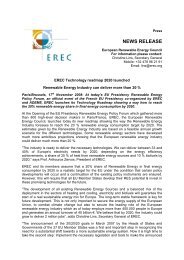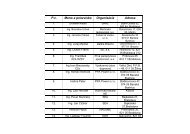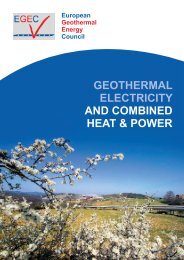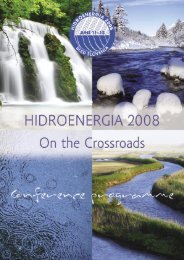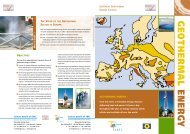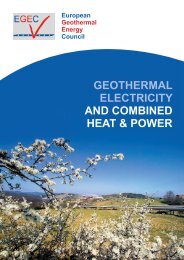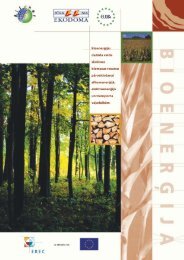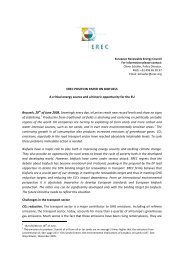CTO Assessment - European Commission
CTO Assessment - European Commission
CTO Assessment - European Commission
You also want an ePaper? Increase the reach of your titles
YUMPU automatically turns print PDFs into web optimized ePapers that Google loves.
SOLTHERM WALLOON<br />
Solar Thermal<br />
Action Plan<br />
Contact: Oona Negro • Walloon Regional Government<br />
4, rue des Brigades d’Irlande • B 5100 Jambes • Belgium<br />
Tel: + 32(0)81 32 34 11 • Email: oona.negro@gov.wallonie.be<br />
Websites: http://daras.wallonie.be and http://energie.wallonie.be<br />
The Walloon Region set an action plan with<br />
the clearly ambitious objective to have<br />
200,000 m 2 of solar thermal collectors<br />
installed by 2010. This objective would<br />
translate into about 60 m 2 per 1,000 inhabitants.<br />
Since January 2001, more than<br />
1,000 households have opted for a solar<br />
thermal system and 5-10 large installations<br />
in public buildings are under construction.<br />
Although the objectives are still far<br />
from being reached, the growing trend has<br />
soared for the last year.<br />
Main motivations<br />
This Action plan was launched to create<br />
the conditions for emergence of the solar<br />
thermal market in Wallonia, to help it to<br />
become self-supporting and to initiate a<br />
wide “cultural” evolution.<br />
Main motivations were the mature technology,<br />
the economically viable investment,<br />
the fact that local Small and Medium Enterprises<br />
(SMEs) which are active in solar<br />
already exist in Wallonia and that the technology<br />
can be used by any household.<br />
The Plan<br />
In order to reach the objectives, supply and<br />
demand needs to match, which requires<br />
both sides to be prepared to choose solar<br />
thermal for the water systems. A voluntary<br />
“Soltherm” agreement was developed<br />
for producers and installers to insure quality,<br />
as well as an awareness raising campaign<br />
to overcome the population’s various<br />
prejudices on solar thermal and a support<br />
system to overcome the barrier of<br />
price.<br />
Overall Evaluation<br />
Expected economical impact could reach<br />
200 million Euros. The population has<br />
shown increasing interest in solar thermal<br />
and SMEs in the water-heating industry<br />
have been able to develop their know-how,<br />
thanks to the “Soltherm” qualification<br />
system.<br />
Enabling factors<br />
This program has been mainly catalysed<br />
by a Green Minister for Energy in place in<br />
Wallonia since 1999.<br />
Instead of facing the difficult economic<br />
comparison between the investment cost<br />
of installing a traditional water system and<br />
the investment cost of installing a solar<br />
thermal system, the information campaign<br />
emphasized the long-term interest of a solar<br />
investment: the calculation of the estimated<br />
cost per kWh solar thermal produced<br />
over a period of 25 years became a<br />
key argument for large systems.<br />
To overcome the barrier of the investment<br />
cost, a generous financial scheme has been<br />
set up including the possibility to combine<br />
several subsidies (Region, Provinces, some<br />
municipalities), so as to cover up to 75%<br />
of the total investment. In practice, about<br />
50% of the cost is covered.<br />
A leasing system is also tested in 8 municipalities,<br />
which could dramatically boost the<br />
market by getting rid of the barrier of initial<br />
investment.<br />
Challenges<br />
Few administrative barriers had to be<br />
faced, as several regional energy information<br />
offices offer free advice to private individuals.<br />
For large systems, audits are<br />
subsidized up to 50%.<br />
A very supportive legislative framework<br />
was also developed, offering a framework<br />
of financial support.<br />
Environmental targets<br />
Emissions reduction, thanks to the installation<br />
of solar thermal collectors, is relatively<br />
low as hot water represents only a<br />
small share (only about 10%) of the total<br />
energy consumption in Wallonia. Nevertheless,<br />
energy awareness has globally increased,<br />
which has an indirect impact on<br />
the environment. Indeed, it appears that<br />
people owning a SDHW system are more<br />
cautious about consuming energy.<br />
Solar thermal Action plan of the Wallon Region<br />
An ambitious objective of 200,000 m 2 solar thermal collectors installed by 2010. An integrated approach: voluntary “Soltherm”<br />
agreement on system quality, installers training, architects training, competition for architects, awareness raising campaign,<br />
subsidies, facilities regarding planning permission, demonstration through public example, movable installation on a trailer,<br />
evaluation of the feasibility of a mechanism of leasing,<br />
A major success<br />
change of general misperception that there was not enough sun in Belgium for solar thermal<br />
more than 150 small and medium enterprises (SMEs) active in heating systems trained to solar technology<br />
more than 120 architects trained in solar technology<br />
50 municipalities (out of 262) offer a local promotion<br />
Domestic hot water production: more than 1,000 SDHW systems installed or 5,200 m 2 (achieved by mid 2003). NB: those figures<br />
don’t include equipment installed before January 2001.<br />
Large collector: 1,000 m 2 by 2003.<br />
<strong>CTO</strong> - Showcase<br />
49



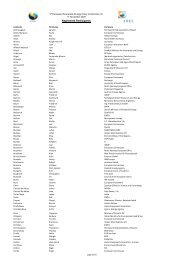
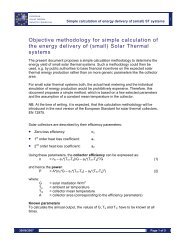
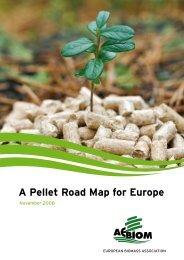
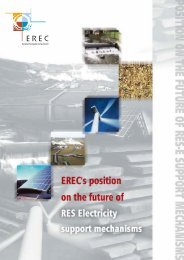
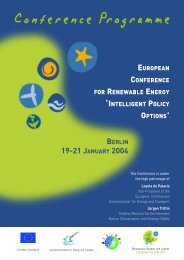
![Energy [R]evolution - Greenpeace](https://img.yumpu.com/47174859/1/184x260/energy-revolution-greenpeace.jpg?quality=85)
